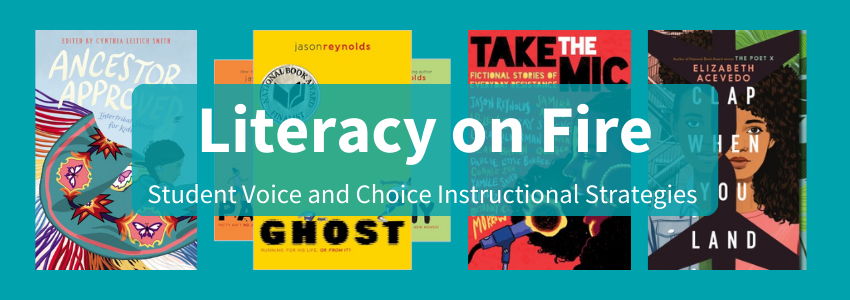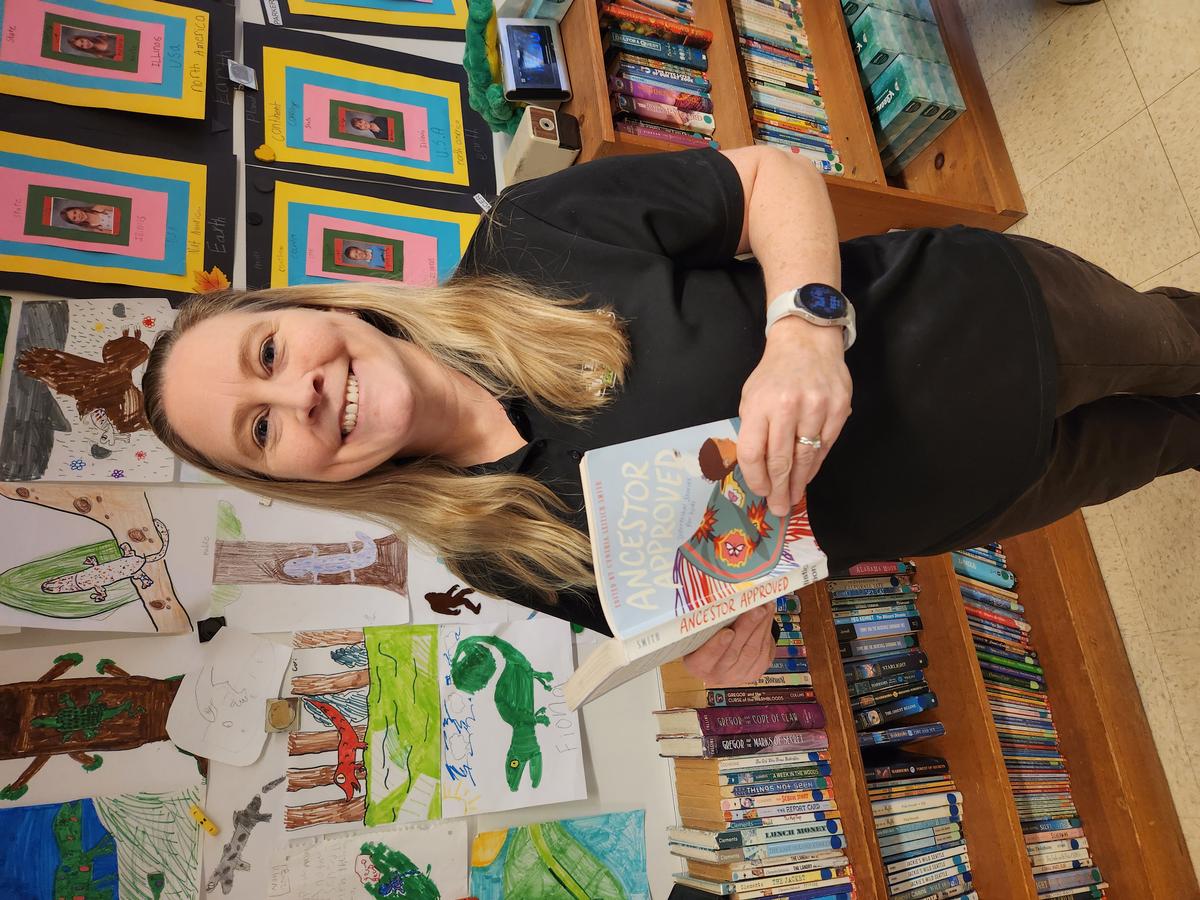

BLOGS > NOVEMBER 28, 2023
BY DR. NIKI WOODRUFF

“So I can burn them,” was my sixteen-year-old daughter’s response to why there were two copies of The House on Mango Street by Sandra Cisneros (1984) sitting on the kitchen table. My first instinct as a literacy lover was pure indignation. How could she possibly want to destroy such a well-known and well-loved piece of literature? After a few calming breaths, I asked more probing questions.
Ultimately, she disclosed that a classmate handed her the extra copy to burn after they commiserated the completion of the two-and-a-half-month whole class novel study. Later, my daughter explained that she did, in fact, enjoy the story, but the over analyzations ruined the experience.
Our students’ love of literacy is literally going up in flames. According to the 2019 Scholastic Kids & Family Reading Report, interest reading is fading away as early as third grade. This “Decline by Nine” occurs in three areas for children between the ages of eight and nine: reading frequency for fun, the importance of and positive attitudes towards reading, as well as the love of reading. In addition, my personal research interviewing fourth- through eighth-grade teachers revealed that instances of student voice and choice (SVC) instructional strategies decreased as the grade level increased. In the end, as students grow older, their opportunity to engage in choice diminishes.
SVC instructional practices are essential components to continued intrinsic literacy motivation and engagement for students, especially adolescents. So, what do we do? How can we put out the fires before all our hard work burns to ashes? As educators of middle and high school students, we have certain mandated curricular requirements, but we must also prioritize positive literacy experiences. For this to occur, SVC needs to be at the heart of practices like independent reading time and class read-alouds.
Whether I’m teaching elementary or high school students, I have a designated time for independent choice reading. No more last-minute trips to the copy machine or scrambling to post an assignment! Reading-to-self is the perfect “bell work” activity that requires zero preparation from me once the procedures are established. Students come into class, sit down, take out their book of choice, and start reading. I will not pretend this activity goes smoothly every moment of every day, but the students quickly understand this time is sacred and expected. For my high school students, the first ten minutes of class alternate daily between a class read-aloud and independent reading of a self-selected book.
My intention is to connect and develop teacher-student relationships while using choice texts as the landscape we navigate together. I circulate and comment about their selected titles. Students are encouraged to create a book critique for their favorite books. These “Readbox Reviews” include the gist of the book without spoilers, two reasons why they like the book, and evidence to support their logic. I provide students with a template to help them compose a script, and then they record themselves presenting their slides. These short videos are uploaded to YouTube and linked to a picture of the book on a virtual “bookshelf.” These book reviews accumulate and are shared year after year with each class. An activity like this can ignite a passion, especially for competitive individuals attempting to convince their classmates to read the book they recommend. Here is one you might enjoy.
Many educators and laypeople alike believe reading aloud is an activity reserved for young children. This conclusion could not be further from the truth. Both adolescents and adults crave listening. It comes in the form of listening to our favorite podcasts or YouTubers. In addition, the benefits are noteworthy: increased reading comprehension, improved listening skills, broadened vocabulary, expanded interest and taste, experiencing a good book read well, building of background knowledge, and developing lifelong readers.
Within the confines of our curriculum, I find engaging texts to bolster these benefits. I focus on selecting books within specific genres or themes, and then allowing my students to vote for their preference. When I book talk each of the preselected texts, I have simultaneously created a buzz around the choice-based read-aloud and exposed students to choices they may pursue on their own during their independent reading time. Read-aloud tips include making sure to read the text ahead of time to be prepared for any areas you wish to omit or discuss, reading with passionate expression that inspires your students to hang on your every word, and exploring titles that are inclusive as well as representative of society rather than stereotypical. For prescriptive curriculums that do not allow for much autonomy, seize a time at least twice a week to integrate these pleasurable interactions with text to keep the love of literacy alive.
Keeping pleasure at the heart of these SVC practices is imperative. Inundating our students with quizzes and in-depth analyses on everything they read will eventually lead them to start a literature bonfire. I believe my daughter’s language arts teacher would have been crushed to hear about her pending pyrotechnics. However, we, as ELA teachers, need to remember that our favorite stories, poems, and books are just that – ours. We need to aim the fire extinguisher at our habits of imposing our preferences onto our students. They deserve the freedom to choose. If not, who knows what other great works of literature will be set ablaze.

Here is a Titlewave® list of books that I have used in my class featuring these titles:

Dr. Niki Woodruff
Fourth Grade Teacher
Batavia School District 101
Dr. Niki Woodruff has been in the field of education for over twenty years. With experience ranging from kindergarten through high school, she is a dedicated educator who focuses on empowering her students to become readers and writers with a voice. In the last 10 years, she earned her master’s in Literacy and her Doctor of Education in Literacy at Judson University. Her research interests include theories that relate to the impacts of teachers’ positionality on their instructional strategies. As an intermediate elementary teacher with her Reading Specialist certification, Dr. Woodruff is passionate about sustaining reading habits and motivation in middle grade students and adolescents in part due to her two teenage daughters. Her mission has been to collaborate with other educators and provide professional development promoting student voice and choice (SVC) in language arts thereby continuing to nurture the love of literacy and strengthen teacher-student relationships.
Follett can help you find more ways to motivate and engage striving readers.
2026 ALA Youth Media Award Winners: Find the Best Children's & YA Books of the Year
January 26, 2026
On their 150th anniversary, the American Library Association (ALA) revealed the ALA YMA 2026 winners and honorees on January 26, 2026, honoring the year’s most exceptional books and media for children and teens. Recognized globally for their impact and excellence, the...
Read more
An Author Interview with Jennie Wood
January 9, 2026
From non-binary author Jennie Wood, creator of the acclaimed graphic novel series Flutter, comes I Didn't Ask For This, which follows a group of kids who share one thing in common: their parents are social media influencers who’ve shared their...
Read more
An Author Interview with Don Everts
December 17, 2025
What peculiar thread connects secret superpowers, chicken farming, Victorian architecture, and the impossible awkwardness of being 14? Debut middle grade author Don Everts weaves it together for us in this conversation about his new book, Oscar and the Mystery of...
Read more
An Author Interview with Sara Amini and Illustrator Shadia Amin
December 17, 2025
Author Sara Amini and artist Shadia Amin team up for this charming, semi-autobiographical middle grade graphic memoir that explores evolving friendships, puberty mishaps, and finding a place to belong. Navigating life as a multiracial girl has never been more hilarious...
Read more
An Author Interview with Katherine Applegate
December 17, 2025
Go behind the scenes with Newbery Medal-winning author and literary superstar Katherine Applegate as she discusses her returns with two exciting new titles releasing in spring! First up is The Littlest Elephant, a picture book adaptation of the best-selling middle grade...
Read more
An Author Interview with Amy Timberlake and Illustrator Jon Klassen
December 17, 2025
Award-winning author Amy Timberlake and illustrator Jon Klassen team up to bring you the latest in the Skunk and Badger trilogy. Rock Paper Incisors follows odd-couple roommates Skunk and Badger as they explore the complexity of friendship and the meaning...
Read more